For those of us who have chosen a career in the amenity horticulture / sports turf industry, we face a lifetime of learning, largely due to the widespread, ever-changing, skill sets we require - along with the raft of machinery and equipment we must understand and utilise to help us do our job efficiently.
I have said for many years we are a jack of all trades and a master of them all. I, like so many other trade professionals, have learnt and acquired many skills over the years. When I started in the industry some 45 years ago, I was fortunate to attend a five-year City & Guilds apprenticeship scheme. That meant I attended college one day a week and spent the rest of the week learning on the job, with support and advice from many of my peers. Since then, I have been able to attend many training and competence courses to keep up to date with legislation and best practice.
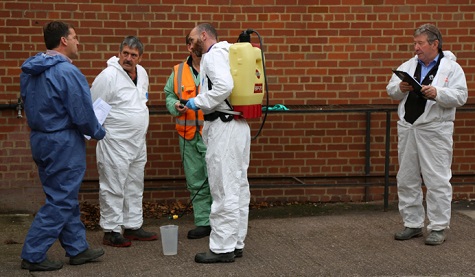
So, it goes without saying, continued training, education and upskilling are essential parts of our ongoing career paths. I myself took up the opportunity to undertake a Masters degree at Cranfield University at the age of 47 to help further my career. We never stop learning.
However, I must say our industry has changed enormously in the last 40 plus years in respect of expectations, career development and methods of working, along with the vast array of technical tools, products and specialist machinery that is available to the modern professional.
The sheer scale, diversity and range of job opportunities is staggering - greenkeeper, groundsman, gardener, arborist, florist, propagator, nursery manager, parks manager, landscaper, contractor, mechanic, sales representative, to name a few. Today we have several training and education providers who continually provide an ever-increasing range of courses.
One such training provider, Lantra, currently offers over 350 specialist courses and qualifications - in our industry alone they provide well over 120 grounds related courses. With over forty years’ experience, the company has become the principal awarding body for our industry.
There are many excellent training providers and qualified instructors and assessors who currently provide a wealth of knowledge and expertise. They help us gain the relevant qualifications and courses required to comply with legislation and become better practitioners.
One such training provider, Ian Sumpter of Mow-Sure Training Ltd, has been involved in the turf care industry since the early 1980s. He works in different roles ranging from amenity horticulture, sports turf management through to training. Since 2002, Ian has had a Key Service Manager & Training Manager role working for one of the leading machinery manufacturers. He is an accomplished trainer who understands the turfcare industry.
Below, Ian sums up the issues he has faced as a training provider during the Covid pandemic and how as a business, he had to adapt and change to survive.
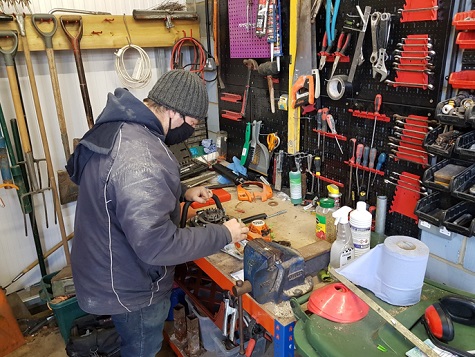
Training Through a Pandemic – Ian Sumpter
We all know and appreciate how tough the past year has been on us physically, mentally and emotionally. These emotions extend into our working life and for some businesses it has made this the toughest year yet.
My business, Mow-Sure training, has seen work completely cease in some areas, with exponential growth in others. This fluctuation in our business has challenged me to look at our delivery methods and adapt to meet the changing needs of our customers.
Having a business that is 50% UK customers and 50% international customers means we are already adept at dealing with customers that are not face to face. This has helped due to the fact that we already have presentations that quickly adapt to online Zoom training.
Having Lantra rise to similar challenges of remote learning over the past year, and in particular developing the ability to deliver some qualifications online, has been a great help to our business. This was recently put to the test when I delivered nine two hour Zoom seminars on Groundcare machinery maintenance over three days for the British and International Golf Greenkeepers association (BIGGA), at their international conference and training event. For these seminars I was able to take the Lantra groundcare machinery maintenance course presentations and adapt them to meet the two hour Zoom requirements. Although the candidates did not gain a Lantra certificate, it has resulted in further interest to complete the full certificated modules.
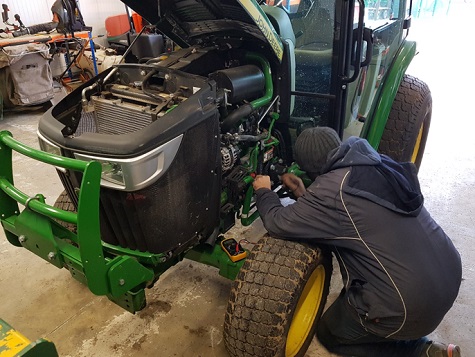
The challenge for us as a training provider has been knowing when online training is the best option, or when face to face training is still required. The other challenge, particularly in ever changing restrictions, is how to deliver face to face training safely.
Before the recent lockdown I was approached by a sports club that was in a position to purchase new equipment. Recognising his obligation under the Provisional Use of Work Equipment Regulation (PUWER), the groundsman was keen to gain a better understanding of how to maintain the new machinery. Fully aware that the Health & Safety Executive recommend and encourage this type of training to continue, I forwarded details of the Lantra Award in Groundcare Machinery Maintenance to the club. To ensure this could be delivered safely, we carried out the five-day course on a 1:1 ratio with both students and trainer wearing masks, observing social distancing and sanitising work areas regularly.
I appreciate it’s not always cost effective to deliver training 1:1, but in this unprecedented time we feel it’s a balance between the business cutting back and the customer accepting a slight increase in the normal charge. Of course, it’s still possible to manage the normal groups of four for courses such as pesticide application or safe use of machinery which can be delivered outside observing guidelines.
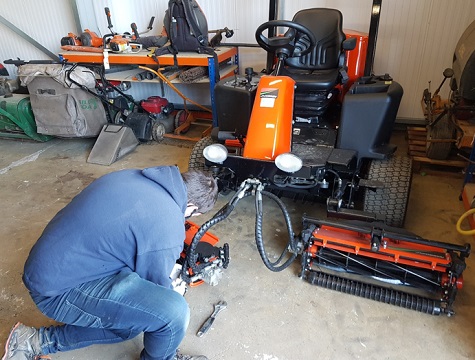
As we see the road map announced by the prime minister of how we come out of this current lockdown, but not necessarily the pandemic, what will the ‘new normal’ look like? As a business we have embraced online learning as an option for our customers. One training course in particular that has been invaluable to us throughout the year is the Lantra online Machinery Health & Safety Course.
This course gives customers the opportunity to meet basic machinery health & safety training and can be done at a time and place that suits them. We have now included this Lantra award into our own certificated Greenkeeper Health & Safety course, giving it a balanced and blended training approach. Therefore, we can see the current remote delivery options with Lantra becoming part of a blended training approach for our business, giving our customers a more varied approach to how they want their training delivered. One example of this is the Lantra Groundcare machinery maintenance courses, which can be delivered in part via Zoom with open mike and tutor candidate interaction. This will then mean we can have the practical sessions condensed, resulting in less 1:1 interaction. We are not out of the woods yet regarding the pandemic, but coming out of lockdown and being flexible with our future training delivery can see business resuming to near ‘normal’.
Adding depth and breadth
I also caught up with Martin Sampson, another Lantra instructor and former grounds manager who I have known for many years, who confirmed how they have been working through the pandemic.
Martin’s company, Sampson Training, took over the Grounds Training business last summer. After the busiest start to the season in years, he says organisations across the country have been catching up with postponed training and planning for the needs of their staff over the coming year.
“With stringent risk assessments in place, we continued to train small groups throughout the pandemic, but with some staff on furlough, other organisations opted to put theirs on hold,” explained Martin. “Everyone has been keen to get back to face-to-face training. From volunteers to company directors, the feedback we’ve received is that there is no substitute for interaction with experienced instructors. Being able to get hands-on with machinery and equipment in a workplace environment is also critical for learners at all levels.”
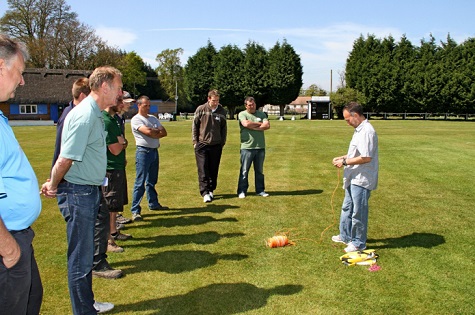
He also says that an increasingly diverse portfolio of courses, tailored to each clients’ needs, is giving managers the opportunity to think beyond health & safety and competency, adding depth and breadth to the knowledge and specialisms within their team.
“Ecology courses, basic tree survey and inspection, pesticides refreshers, synthetic surface maintenance and machinery maintenance courses have all become increasingly popular for grounds, greenkeeping, estates and local authority teams,” he adds.
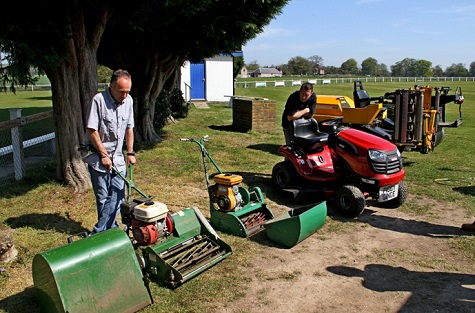
Martin used last year’s lockdown time to further his own professional development, becoming a Lantra End Point Assessor for greenkeeping and sports turf, and more recently a Technical Verifier.
Grounds Training also expanded its range of open courses. “The majority of our training takes place at clients’ sites,” he explains, “but we’re committed to giving individuals access to training too, whether they’re volunteers, self-employed people, or newcomers looking to secure their first role in the industry. In addition to our monthly PA1/PA6A courses, we added PA2 (boom sprayer), sports line marking, bowling green maintenance, basic tree survey and inspection, and lawn care.
“We’ve also added new training venues in South Wales, the Midlands, Dorset and Cornwall.”